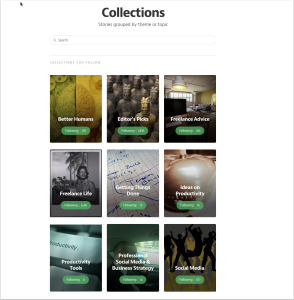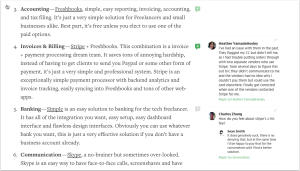 Are you looking for a platform that will allow you to share your ideas, spread news about your writing, and workshop your drafts with other writers and readers?
If so, Medium might be the right platform for you.
Are you looking for a platform that will allow you to share your ideas, spread news about your writing, and workshop your drafts with other writers and readers?
If so, Medium might be the right platform for you.
In this post you will learn what Medium is and how it can help you expand your writer platform.
What is Medium?
Founded by Twitter and Blogger founders Evan Williams and Biz Stone, Medium stands as "a new place on the Internet where people share ideas and stories that are longer than 140 characters."
Medium allows you to blog without a blog.
It has a clean appearance that presents both words and pictures in a visually appealing way. In fact, you can blog using just pictures.
However, Medium is more than a blogging platform.
Medium curates and workshops content through user-established and moderated collections.
 What Are Medium Collections?
What Are Medium Collections?
Medium collections organize and filter content.
You can use Medium to explore your interests in 2 ways:
1. You can use its search to find a collection that contains user-submitted articles or photos that discuss, or depict, a topic of interest.
2. You can create a collection.
Responsibilities of Collection Creators
When you create a collection, you become its moderator.
User-writers who share your interest may submit essays to your collection for publication. As collection moderator, you decide which of the submitted content to publish.
If you opt to pass on a submission, Medium requires that you provide the author with a reason for your rejection.
User-moderators help Medium curate content in 3 ways:
1. Moderator-established collections help writers see what kinds of visual and written content users want to read about.
2. Moderators help vet the content to make sure it fits within the collection they establish.
3. Moderators help readers easily find content they want to read.
The idea behind user-moderated collections is that user-readers will be able to find a collection that has content that matches their particular interest.
 Medium As A Tool for Writers
Medium As A Tool for Writers
Medium encourages posts by giving writers the option to request reader-feedback on their work.
Medium serves as a great tool for writers who need to workshop a piece because they lack a writing group.
It also serves as a great tool for writers who want to market their books.
 Medium as a Book Marketing Tool
Medium as a Book Marketing Tool
Late last year, Walter Isaacson posted excerpts of his new book about the "Information Age" to Medium for user feedback.
18,000 people read Isaacson's first excerpt. 125 readers commented, dozens of people sent him e-mails, and several writers wrote full-length articles that explored the ideas in his post.
Isaacson posted to Medium because he arrived at "the point of the book where people started using the Internet to collaborate" and "it didn't take a genius to say, 'why don't I use the Internet to collaborate?'"*
Isaacson used Medium to lessen his writer's isolation as well as generate buzz for his new book.
By asking readers to submit feedback, Isaacson allowed them to participate in his creative process, which in turn gave these readers a stake in his new book.
A Great Idea With Strings Attached
Medium is quickly becoming a great platform for writers because it provides them with the opportunities to both workshop and market their writing.
It is a platform for writers who want to blog, but do not want to take on the time commitment that comes with maintaining a blog.
With that said, WRITERS BEWARE.
Medium belongs to Evan Williams and Biz Stone. It is there platform, not yours.
Williams and Stone own the information for Medium users, not you.
This means that just like your Twitter followers and Facebook friends, you have no way to contact them all directly nor do you have a say in how Williams & Stone reproduce, post, or monetize their site with your content.
Conclusion
I view Medium as a great supplement to my digital platform.
Although I have not posted to Medium yet, I can see using it like Isaacson did, as a place to escape periods of writer isolation, workshop sections of my book, and interact with readers interested in early American History.
Medium may also help me expand my digital platform.
By including my website and blog URLs in my byline, I may lead Medium readers and writers to my digital hub and mailing list.
These are experiments I might try as I revise my book.
 What Do You Think?
What Do You Think?
Do you use Medium? How do you use it and what has your experience been like?
What other platforms do you use to help extend the reach of your writer platform?
*Joshua Brustein, "Walter Isaacson on Crowdsourcing his New Book," Bloomberg Businessweek, December 30, 2013.
You can also read about Isaacson's use of Medium at The Christian Science Monitor and Fortune Magazine.
Photo of Walter Isaacson courtesy of David Shankbone.






